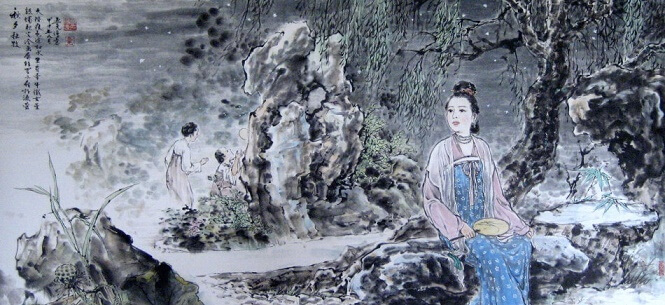In the Autumn Night
- Poetry of Du Mu

Her candle-light is silvery on her chill bright screen.
Her little silk fan is for fireflies....
She lies watching her staircase cold in the moon,
And two stars parted by the River of Heaven.
Seven-character-quatrain
Through employing chilly diction and imagery, Du Mu creates an aura of loneliness. It can be inferred that the subject of this poem is a young lady who lives in royalty; her silk fan in the second line of the poem suggests this to be true, as silk was a rare commodity and a symbol of wealth in ancient China. However, instead of being surrounded by other friends, this maiden plays with fireflies and sits alone in the middle of the night to gaze at the stars in the galaxy. Evidently, she is a lonely girl who, for some unknown reason, lives in isolation. Du Mu furthers this aura of isolation with the chilly setting; the terms 冷 (cold) and 凉 (cool) signify a lack of vitality and energy that comes in the presence of other people. Perhaps the reason for her secluded state lies in a broken heart; after all, the last line alludes to a prominent Chinese legend of the Cowherd and the Weaving Maid, two lovers who were forced to separate due to their different statuses, one being a human and the other being a heavenly being. Young maidens who live in royalty often serve as concubines to the emperor; maybe this maiden is, in fact, a concubine for the emperor, but harbors a childhood love that distances her from her imperial friends. Although the reason behind her solitude remains unknown, it is clear that the subject of this poem experiences a desolate state of mind.
银烛秋光冷画屏,轻罗小扇扑流萤。
天阶夜色凉如水,卧看牵牛织女星。
- Why Chinese poems is so special?
- The most distinctive features of Chinese poetry are: concision- many poems are only four lines, and few are much longer than eight; ambiguity- number, tense and parts of speech are often undetermined, creating particularly rich interpretative possibilities; and structure- most poems follow quite strict formal patterns which have beauty in themselves as well as highlighting meaningful contrasts.
- How to read a Chinese poem?
- Like an English poem, but more so. Everything is there for a reason, so try to find that reason. Think about all the possible connotations, and be aware of the different possibilities of number and tense. Look for contrasts: within lines, between the lines of each couplet and between successive couplets. Above all, don't worry about what the poet meant- find your meaning.